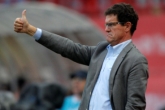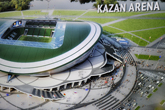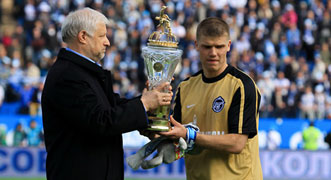Russia to play in World Cup after 12-year absence

The last time Russia played at the World Cup was way back in 2002. Source: Mikhail Sinitsyn / RG
Drawing 1:1 with Azerbaijan in their final match of the qualifiers in Baku, Russia booked their place as winners of Group F, ensuring that they will play at the World Cup finals in Brazil under the guidance of coach Fabio Capello.
This may not seem like much of a major achievement for a country the size of Russia, but bear in mind that the last time Russia played at the World Cup was way back in 2002, in Japan and Korea.
Only one player remains on the squad from that time — the 30-year old Zenit striker Alexander Kerzhakov.
For all the other leading names on the Russian squad — Roman Shirokov, Sergey Ignashevich, Igor Akinfeev, and many others—this will be the first and probably last outing on the greatest soccer stage of their careers.
This is a huge chance for the most successful generation of Russian soccer players (bronze medal winners from Euro 2008), especially given that the team is managed by one of the world’s most decorated coaches, 67-year-old Fabio Capello.
In just one year, this native of Pieris has changed the way Russians view the concept of a foreign coach.
Unlike his Dutch predecessors, Capello spends most of the year in Russia, attending three or four matches every round of the Russian Premier League.
Don Fabio has been spotted in Saransk, Samara, Perm and other remote corners of the country. Under Capello, 10 new players have made their debuts on the national team, six of whom are defenders previously known only to the soccer team selectors.
No one yields influence over Capello. Captain Igor Denisov lost his place on the team at the end of the qualifiers, with Spartak’s Denis Glushakov the preferred replacement.
Russian Premier League top scorer, Rostov’s Artem Dzyuba, has not been called up, but Dinamo striker Fedor Smolov, yet to find the net in official matches for more than two years, is a regular fixture in the Italian coach’s training camps.
At the very start of the qualifiers, Capello taught the players to defend for the entire team — to stand together, with each member having specific functions to perform.
The team is now gradually gelling together as one, keeping the ball and maintaining the previous principles of compactness, as adopted in the first stage of Fabio’s work.
Related:
Russia to create post-Soviet champions league
And the team is gaining in class. The fact that this is a work in progress is clear to see from the goals conceded, at the end of the first half against Northern Ireland and in the second half against Luxembourg, Israel and Azerbaijan.
Fabio Capello himself admits that goals conceded at the end of a half are a sign of a lack of class. The team is now being instilled with an understanding that every game has to be finished just as well as it is started — be it a tournament, a separate match or even a 45-minute half.
After the abject failure of Euro2012, the national team has found itself a genuine leader, a man able to take the country further, to instil and determine the rhythm and tempo of a game: when to switch to attack, and when to stop and play in specific positions.
This person is Zenit midfielder Roman Shirokov, the team’s new captain and a somewhat contradictory figure. He does not get on well with the fans, he is forever in conflict with soccer pundits and he maintains an active social life.
For Russia, Shirokov is more than just a soccer player: He has more than 200,000 Twitter followers, his face adorns the covers of glossy magazines, and interviews with the national team captain even appear in the political columns.
Shirokov’s assist in the home match against Portugal forced observers to believe that Russia is quite capable of overtaking the semi-finalists of the last World Cup in the final reckoning, while the goal scored against Azerbaijan served to strengthen Russia’s advantage over its rivals.
Evgeny Lovchev, the Soviet Union’s Player of the Year for 1972, believes the team made it through the qualifiers rather indifferently. Lovchev did, however, highlight the role played by Shirokov.
“On the whole, Capello’s wards were not that impressive. Apart from the 4:0 thrashing of Israel, I cannot recall any stand-out games from these qualifiers.
The ground-out victory over Portugal was frankly given too much coverage. Many of the players are still playing below their potential and may prove to be superfluous to needs when it comes to the latter stages of the World Cup,” said Lovchev.
“The one player above reproach is Roman Shirokov. His play is intelligent: If he makes a pass, it is to the right player or for the right strike, not just to scramble the ball away. Roman was the right choice for the captain’s armband; it is through Roman that the ideas of the coach’s team make it onto the field.”
Under the watchful eye of Shirokov, a new generation is rising through the ranks of the national team, including 23-year-old midfielder Oleg Shatov and 26-year-old Vladimir Granat.
These players are the future of Russian soccer, and they have already become key players during the most recent qualifying run.
Without a doubt, the team has suffered setbacks — the deserved defeat in Lisbon and the weak game played in Belfast. Yet the team also needs games like these to gel together, to understand the responsibility they have been given, and to learn how to take the knocks.
For now, Capello is handling his role admirably, with Sports Minister Vitaly Mutko hinting at an extension of Fabio’s contract through 2018, when the World Cup will be held in Russia.
It would seem that this is the best time to do this — although getting to the World Cup and performing well once you are there are two very different things.
Capello understands this very well and is hardly likely to take on such long-standing obligations. It is no easy matter to become accepted in Russia as one of the country’s own.
The language barrier, the long winter and all the intrigues in the Russian soccer world may make Capello just another temporary fix who stands to make a considerable amount of money working in Russia.
The head coach of the Russian Premier League champions, Moscow’s CSKA Leonid Slutsky, believes that Capello is a good fit as coach of the national team.
“Capello is a top manager. He has confirmed his level everywhere he has worked, and he is demonstrating excellent results with the Russian national team. Should Capello’s contract be extended to 2018? I don't know all the ins and outs of his contract, but, if we want our national team to be managed by one of the world's best, Capello is surely the best option for us,” said Slutsky. “I don’t think we could find a stronger candidate.”
For now, Capello has six months to work on the team’s shortcomings and take the next step forward: getting though the group stage and into the playoffs at the World Cup, which is something that has not been achieved since 1986.
Anything less than this for Capello will be taken as a failure, both by the Russian Football Union and by the fans.
All rights reserved by Rossiyskaya Gazeta.
Subscribe
to our newsletter!
Get the week's best stories straight to your inbox


